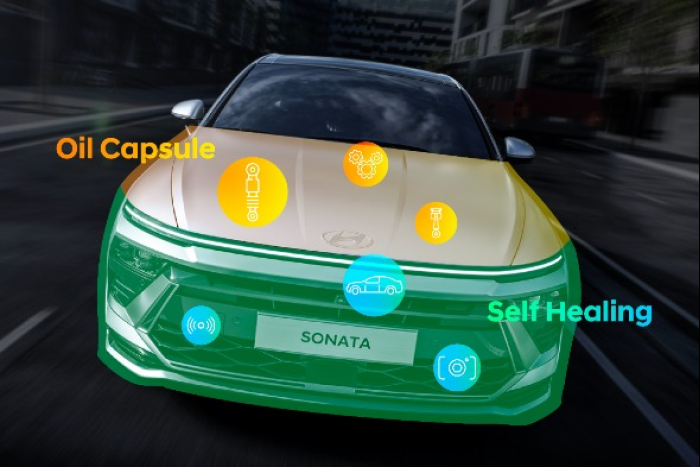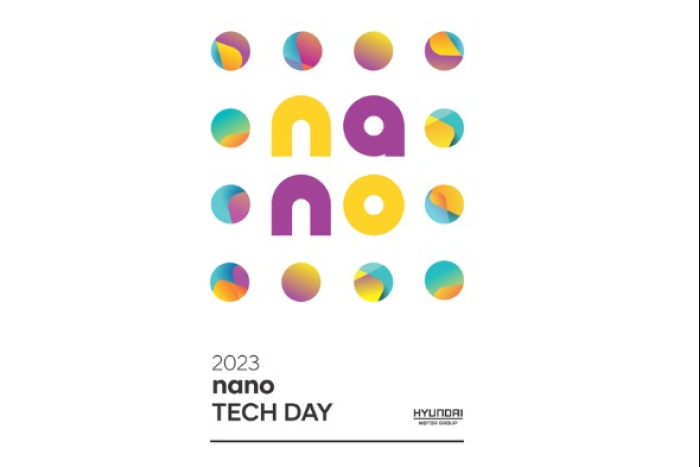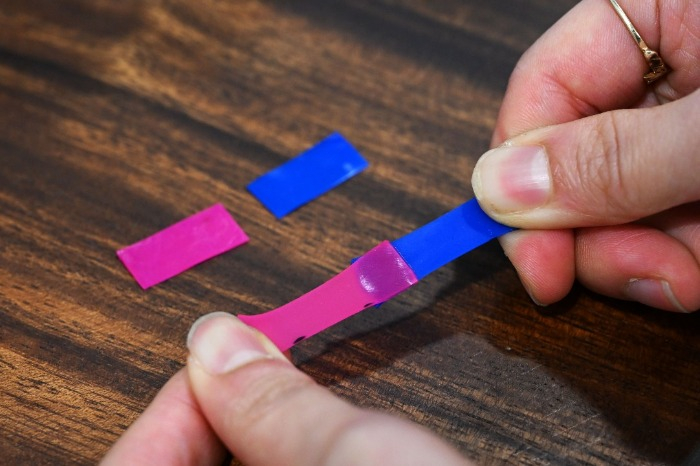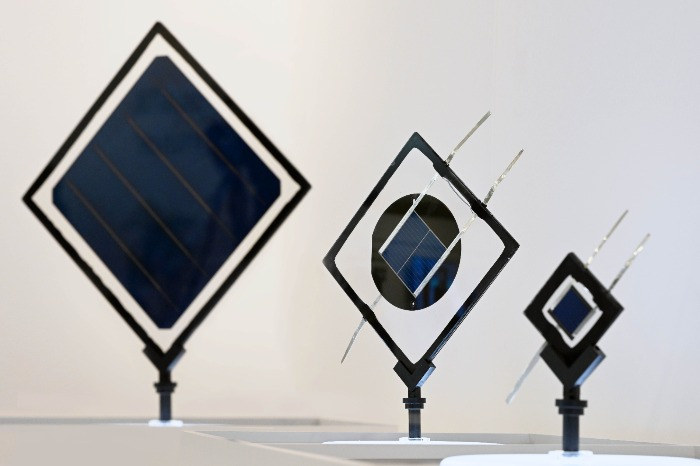Hyundai Motor to advance future mobility with nanotechnology
S.Korea’s leading auto group shows off its nanomaterials technologies that let a car self-repair its scratches and produce its own power
By Jul 20, 2023 (Gmt+09:00)
LG Chem to sell water filter business to Glenwood PE for $692 million


Kyobo Life poised to buy Japan’s SBI Group-owned savings bank


KT&G eyes overseas M&A after rejecting activist fund's offer


StockX in merger talks with Naver’s online reseller Kream


Mirae Asset to be named Korea Post’s core real estate fund operator



Hyundai Motor Group, which seeks to pivot from a fast follower to a game changer in the global auto sector, has unveiled advanced materials technologies that could allow it to lead the mobility transition toward electrification and carbon neutrality.
According to the parent of South Korea’s top two carmakers Hyundai Motor Co. and Kia Corp. on Thursday, the latest development in its nanomaterials technologies will enable cars to fix their own scratches, produce their own electricity and keep their cabin temperature cool even in scorching heat.
Nanotechnology is the science and engineering of miniscule things, and 1 nanometer is one-billionth of a meter. A human hair has a diameter of about 100,000 nanometers.
Hyundai Motor Group is betting big on advanced materials like nanomaterials because materials lie at the heart of innovation in future mobility technologies, which encompass electrification, self-driving and software defined vehicles (SDV), according to the company.

“Materials innovation is not only the foundation of technology but also a core part of industry convergence, and it has always preceded technology innovation,” said Lee Jong-soo, vice president at Hyundai Motor Group’s Institute of Advanced Technology Development, at the company’s Nano Tech Day on Thursday.
Hyundai Motor Group will work with the government and academia to build a stable supply chain for nanomaterials and components for mobility use, said the company.
SELF-REPAIRING & SELF-CHARGING
Hyundai Motor has introduced six key nano-material technologies: self-healing polymer coatings, oil-capsule polymer coatings, transparent perovskite solar cells, tandem solar cells, pressure-sensitive materials and transparent radiant cooling films.

The self-healing polymer coating and oil-capsule polymer coating, which are developed using nanotechnology, are expected to further advance vehicle electrification and self-driving technologies.
Hyundai Motor said its self-healing polymer coating enables the car to repair its own scratches and restore surfaces nearly to their original condition within a few hours. Achieving the same effects requires a few days with rivals' technology, such as Nissan’s Scratch Shield.
The Korean auto giant plans a phased rollout of electrification components featuring self-healing polymer coatings and oil-capsule polymer coatings starting next year.
The self-healing coating will be especially useful when it is used in cameras and LiDAR, which acts as electronic eyes in autonomous driving cars.
The oil-capsule polymer coating creates oil layers on the surfaces of auto parts whenever surface friction breaks oil capsules. The innovation is expected to significantly extend the lifespan of auto parts, according to Hyundai Motor Group.
Its transparent solar cells and tandem solar cells are also expected to markedly improve the energy efficiency of EVs.

Hyundai Motor’s next-generation solar cell technology uses perovskite, which improves a solar cell’s power generation efficiency by 30% compared with conventional silicon-based solar cell materials.
The transparent perovskite solar cells can be applied not only to car surfaces and windows but also to building windows and glass walls.
A tandem solar cell, consisting of a perovskite cell and a silicon cell, is expected to increase EV’s energy efficiency by 40% and its driving range by at least 40 kilometers respectively, claimed Hyundai Motor.
The company also displayed pressure-sensitive materials and transparent radiant cooling film that uses carbon nanotubes.
The pressure-sensitive material can convert pressure energy into electronic signals without sensors. It can be used in car seats to only heat seat parts that touch passengers’ bodies.
The cooling film will keep the car's indoor temperature cool even in sweltering summer weather, the company said.
Write to Nan-Sae Bin at binthere@hankyung.com
Sookyung Seo edited this article.
-
 Electric vehiclesHyundai Motor Way: New strategy to accelerate EV push
Electric vehiclesHyundai Motor Way: New strategy to accelerate EV pushJun 20, 2023 (Gmt+09:00)
4 Min read -
 Future mobilityHyundai Motor showcases future mobility in new Spider-Man film
Future mobilityHyundai Motor showcases future mobility in new Spider-Man filmJun 09, 2023 (Gmt+09:00)
1 Min read -
 Future mobilityHyundai Motor to develop lunar exploration mobility Rover
Future mobilityHyundai Motor to develop lunar exploration mobility RoverApr 20, 2023 (Gmt+09:00)
1 Min read -
 AutomobilesHyundai Motor wins Newsweek World’s Greatest Auto Disruptors Awards
AutomobilesHyundai Motor wins Newsweek World’s Greatest Auto Disruptors AwardsApr 05, 2023 (Gmt+09:00)
1 Min read -
 Future mobilityHyundai Motor expands partnership with quantum computing firm IonQ
Future mobilityHyundai Motor expands partnership with quantum computing firm IonQApr 20, 2022 (Gmt+09:00)
3 Min read -
 Future mobilityHyundai Motor invests in cloud, hydrogen firms for future mobility
Future mobilityHyundai Motor invests in cloud, hydrogen firms for future mobilityMar 17, 2022 (Gmt+09:00)
2 Min read


